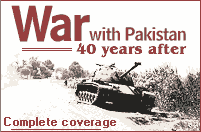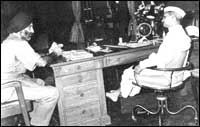The first and only Marshal of the Indian Air Force, Arjan Singh, was born in Kohali village in Lyalpur, now in Pakistan, on April 15, 1919.
After studying at the government high school in Montgomery and the government college in Lahore, he was selected for the Indian Air Force, and sailed for Cranwell, England, in 1938, a few months before he finished his BA degree.
 But his training was cut short by World War II, which began in September 1939, and he was sent back to join the only Indian Air Force squadron which was based at Ambala.
But his training was cut short by World War II, which began in September 1939, and he was sent back to join the only Indian Air Force squadron which was based at Ambala.
In 1940, his Hawker Audax was shot down by the Pathans in the North West Frontier Province in what is now Pakistan. "Within two weeks, I was flying again," he recalls. He also fought against the Japanese over Rangoon.
He has flown over 60 different kinds of aircraft, ranging from biplanes to Gnats and Vampires. He took over as Chief of the Air Staff on July 16, 1964, a year before the 1965 war with Pakistan.
He shared memories of that war with Managing Editor (National Affairs) Sheela Bhatt.
Continuing our series on The 1965 War, 40 Years On.
The 1965 war is a much talked about story. The militants or terrorists infiltrated Kashmir in early August of 1965. They came with an idea and an assessment that they would make the people rise in their favour and they would easily overpower our defence forces.
First, our defence forces fought quite well.  Second, it was wonderful that not a single Kashmiri supported them at that time. The militants didn't get what they thought they would. No one knows how many raiders were there but they were a few thousands of them.
Second, it was wonderful that not a single Kashmiri supported them at that time. The militants didn't get what they thought they would. No one knows how many raiders were there but they were a few thousands of them.
There were many in civilian clothes, but they belonged to the military. Most of them were retired servicemen, so they knew how to fight and how to fire. But though they were quite determined, they could not get any help from the local people. Infiltrators can operate only if they get help from the local people.
At first, both Pakistan and India thought the fighting would be contained only within J&K.
But somehow when they knew they would not succeed in the valley, they launched a very big attack in Chamb-Jaurian, which is very close to Jammu and is on the Line of Control. Their idea was to cut the lines of communication, overpower some of the forces.
The main thing was there was a vital bridge at Akhnoor. After succeeding at Akhnoor they would have gone to Jammu and Adampor.
The attack at Akhnoor was a great success because we didn't have enough forces over there. At that point, the army said that unless they had air support they would not be able to stop them from advancing.
As far as the Indian Air Force is concerned, we have to be prepared all the time. We are not going to get any warning. We didn't in this case also. The air force just cannot say 'Give us ten days or twenty days.' Right now, even in 2005, if they are asked they will operate in two hours.
I am quite certain, I am not speaking of behalf of the Chief of the Air Staff. It is his business. He knows the air force much better than I do. I am out of date now. But my instincts say the air force will take off in two hours. Image: Then Air Chief Marshal Arjan Singh with then prime minister Lal Bahadur Shastri.
 Then army chief General Joyanto Nath Chaudhury needed specific approval from the government before the air action could start. After the Chamb-Jaurian attack by Pakistan, the army requested that the air force should be used.
Then army chief General Joyanto Nath Chaudhury needed specific approval from the government before the air action could start. After the Chamb-Jaurian attack by Pakistan, the army requested that the air force should be used.
General Chaudhary and I went to meet then defence minister Yashwantrao Chauhan. He was a very good defence minister; he was available to us all the time. He was a calm person. He also knew the military situation was not quite in our favour.
He also realised as defence minister that the air force should participate in the war if the army wants it.
He asked only one or two questions. He asked me," How long would you take to attack?"
I told him, "It will take one hour."
In five minutes he gave us the go ahead.
We could attack in one hour because we had our forces on alert in Pathankot due to the tense situation. We attacked Chamb-Jaurian within one hour of that order. It is a historical fact.
But once you start air action, then the war widens. It doesn't remain local, it spreads across hundred of miles.
For me the issue was only one: since I am an air force officer, I want to fight.
Pakistan was warned by then prime minister Lal Bahadur Shastri that an attack on any part of India -- and we consider the area on our side of the Line of Control part of India -- would be considered as an attack on India as a whole.
We used to meet the PM at 1, Motilal Nehru Marg. Shastri was a very cool person. He would listen to us carefully. In the end, he would say either wait or carry it out. After the infiltration began in the valley, he would meet us to discuss how prepared we were.
Second, India had to react somewhere else. In wars, the fighting is always done at the place that is favourable to you. We were fighting at a place of the opponents' choice.
You have got to decide quickly where you want to fight. Our decision was a reaction to the August 3 attack on Chamb-Jaurian, which was quite successful on the part of Pakistan.
At a crucial meeting a few days before we attacked Lahore, General Chaudhary told the PM that situation in Chamb-Jaurian was not in our favour, and the only way to stop them was to attack somewhere else.
The army needed the prime minister's permission to open a new front in Lahore because now we were talking about the International Border which starts from south of Jammu. Pakistan thought the fighting would be limited to J&K as long as their forces continued attacking J&K.
We knew the forces Pakistan had deployed in Chamb-Jaurian sector would have to be withdrawn to fight somewhere else. Exactly that happened.
As soon as we started moving from the Amritsar front their forces from Sialkot started moving to Lahore. Jammu went into the background. You can never fight a big battle in a mountain area. You have to commit too much army and air force. Everything along the LoC has to go from Pathankot.
The enemy can interrupt just one road to stop supplies. A few people can fire at you with rockets and stop supplies. We didn't want to get into that situation.
Therefore, the attack on Lahore was a 100 per cent correct decision. There was no other way.
The government decided, naturally, on the recommendation of the defence forces, primarily of the army, that the attack should take place somewhere else. It was suitable for the army to attack on the Lahore front. It is quite true that the first attack across the International Border was by our forces, by our army. It took place at 4 am in the morning.
The army felt there was no other possible way than to deploy a lot of force over there to stop the attack. Had it mounted forces in Chamb-Jaurian it would have favoured Pakistan. Most of the Pakistan military bases -- Sialkot, Jhelum and others -- were located across the border from Chamb-Jaurian.
In our case, our forces were either in the Kashmir valley or in the barracks.
General Chaudhary was not reluctant to move ahead, but I would say he was quite cautious. That is all I would say. He was cautious because he knew his service. I didn't know the army so well.
The Indian Air Force wanted to fight. My squadron leaders and flight lieutenants, all of us were eager to fight. Unless they are keen I can't have confidence. This is a inter-connected matter. You have got to know what a person can do before you order him to do what you want him to do.
The army took a few days. Always, the movement of the army is more difficult; the air force is much easier.
We didn't need time. Our forward bases at Halwara near Ludhiana, Adampur and Pathankot were ready to strike.
They had a back-up system ready in Ambala which is a very important base. Even Agra and Hinden in Uttar Pradesh were important back-ups.
In the war you worry for the first couple of days but when you start you get so busy you don't get time to worry. In this war we saw that our fighters are able to operate anywhere in Pakistan.
We also attacked Karachi and other places. Our successful operations were in Sargodha and Peshawar. Our main task was to strike vehicles and trains carrying materials for their army. We attacked a number of army trucks and troops.
Our Canberras attacked Peshawar many times. With the Canberra we could attack any place in Pakistan. We attacked Peshawar because they had a lot of air force strength there. All those were night attacks; at that time night operations were not as perfect as today.
There was fear in Peshawar. I don't how far it is correct but Pakistan did move its bases into Iran to save its forces.





